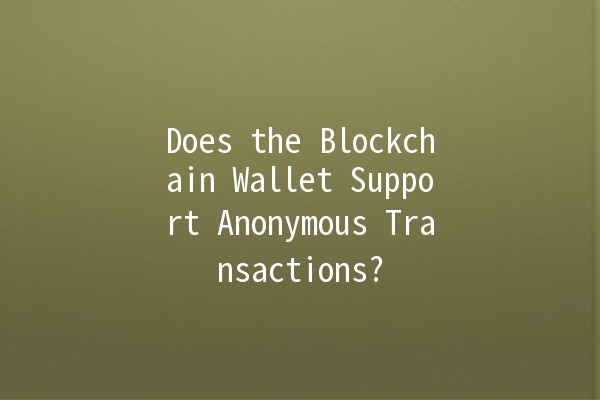




Blockchain wallets serve as a crucial component of the cryptocurrency ecosystem, allowing users to store, send, and receive digital assets securely. Unlike traditional wallets that hold physical money, blockchain wallets leverage cryptographic technology to manage private and public keys. The public key functions as an address where others can send cryptocurrencies, while the private key grants users control over the funds stored in their wallet.

With the growth of cryptocurrencies, the question of anonymity and privacy has become a critical issue. Many users wonder: Do blockchain wallets support anonymous transactions?
In the context of blockchain and cryptocurrencies, anonymity refers to the ability to conduct transactions without revealing the identities involved. While Bitcoin and many other cryptocurrencies operate on a public ledger—meaning all transactions are visible—the identities behind the public addresses can be obscured.
The answer varies based on the type of wallet and cryptocurrency used.
Most traditional blockchain wallets, like those for Bitcoin, provide a level of pseudonymity but not complete anonymity. Since Bitcoin transactions are recorded on a public ledger, while the wallet addresses do not directly reveal the user's identity, they can be traced back to individuals through various means, especially if users link their wallet addresses to public information.
Privacyfocused wallets or software often include additional features that enhance anonymity. For example, wallets like Wasabi Wallet or Samourai Wallet incorporate builtin mixing services, which can help obscure transaction trails. Users of these wallets can implement more robust security measures that make it significantly harder to trace their activities.
For users deeply concerned about anonymity, employing decentralized privacy coins is the best practice. In addition to using private wallets, utilizing coins like Monero provides builtin features such as stealth addresses and ring signatures, making it challenging for unauthorized parties to analyze transaction data.
As governments around the world tighten regulations on cryptocurrencies, many exchanges and wallets implement Know Your Customer (KYC) protocols. These protocols require users to verify their identities and could compromise the level of anonymity, even with privacy coins. Users should be aware of the potential tradeoff between convenience and privacy when selecting wallets.
Using a combination of hot and cold wallets can also enhance anonymity. By keeping a part of your holdings in a cold wallet, away from public scrutiny, users can protect their primary funds while utilizing hot wallets for everyday transactions.
Here are some practical techniques to bolster anonymity when using blockchain wallets:
Explanation: Opt for wallets that prioritize user privacy and anonymity features.
Example: Tools like Wasabi Wallet or Samourai Wallet provide added layers of confidentiality, making it difficult for others to analyze transaction histories.
Explanation: Enhancing security with 2FA significantly reduces the risk of unauthorized access to your wallet.
Example: Utilizing an app like Google Authenticator alongside your wallet can help ensure that even if someone has your password, they cannot access your funds.
Explanation: Unlike centralized exchanges that often require KYC verification, decentralized exchanges (DEXs) allow for more anonymity in trading.
Example: Using platforms like Uniswap or Sushiswap can facilitate trades without the need for disclosing personal information.
Explanation: Regularly creating new wallet addresses minimizes the potential for others to track your spending habits.
Example: Many wallets offer the option for users to generate new addresses automatically after each transaction, promoting greater privacy.
Explanation: Masking your IP address with a Virtual Private Network (VPN) enhances your online privacy when accessing wallets.
Example: A reliable VPN service can help encrypt your internet connection, making it difficult for potential eavesdroppers to monitor your activities.
Yes, while blockchain transactions are pseudonymous, they can be traced back to individuals if sufficient information is available. Analysts can sometimes link addresses to real identities, especially if users have shared their wallet addresses publicly.
While privacy coins offer enhanced anonymity features over standard cryptocurrencies, such as hiding transaction amounts and participants, no system guarantees complete anonymity. Sophisticated tracking techniques and analysis can still potentially identify users.
Tools like mixing services (CoinJoin), privacyfocused wallets (Wasabi Wallet), and using privacy coins (Monero) help enhance anonymity when handling cryptocurrencies.
Yes, while anonymous transactions can protect your identity, they can also attract scrutiny from regulators. Increases in illegal activities involving cryptocurrencies have prompted governments to tighten regulations, which could impact the usability of anonymityenhancing tools.
If you aren’t using a VPN or similar anonymizing method, your internet service provider (ISP) can track your online activities, including the exchanges and wallets you access. Using a VPN helps obscure this information.
The legality of using anonymous wallets varies by jurisdiction. While many countries permit their use, others may impose restrictions. It’s essential to understand the regulations surrounding cryptocurrencies in your country to avoid legal complications.
The dynamics of anonymity in blockchain wallets rest on a fine balance between user privacy and regulatory compliance. While traditional cryptocurrency transactions might offer a level of obscurity, users seeking true anonymity may need to turn to specialized wallets and privacyfocused coins. It’s crucial to stay informed about the tools available and the potential risks involved in pursuing complete anonymity. By adopting best practices and utilizing privacyenhancing technologies, users can maintain a degree of confidentiality while navigating the digital currency landscape.